Global athletes to follow at Paris Paralympics
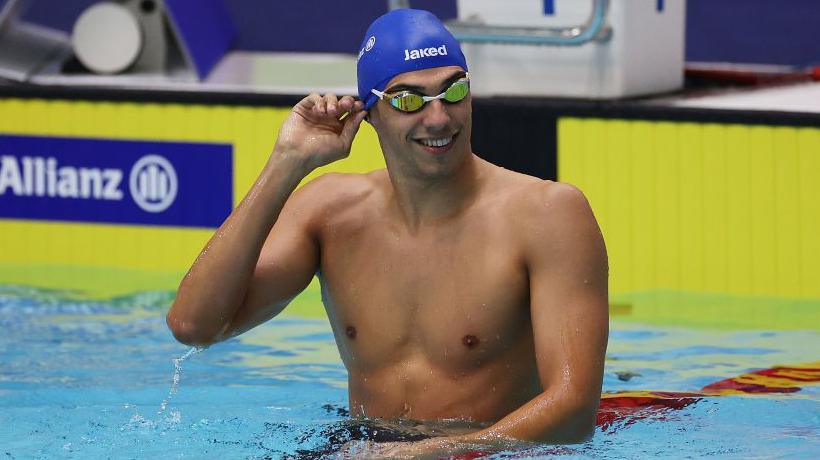
Simone Barlaam will lead the Italian Para-swimming charge in Paris
- Published
Paris will welcome about 4,500 athletes to the city to compete in the first summer Paralympics to be hosted by France.
Competitors will take part in 22 sports across the 11 days of competition with 549 gold medals up for grabs.
The Games will feature the usual mix of experienced international stars hoping to enhance their reputations and newcomers aiming to make their mark.
BBC Sport looks at some of the global athletes who are aiming to shine on the biggest stage when action starts on Thursday, 29 August.
Simone Barlaam (Italy) - Para-swimming
Barlaam has been a key figure in Italy's emergence as a Paralympic powerhouse in the pool.
The 24-year-old from Milan, who was born with one leg shorter than the other because of a hip issue, spent time in Paris as a child as he had a number of surgeries.
After starting swimming competitively aged 14, he made his international debut at the 2017 World Championships in Mexico and has become a leading performer in the S9 category.
Barlaam says he struggled at his first Paralympics in Tokyo, where he won gold, two silvers and a bronze, but comes to Paris after winning six golds in six races at last year's Worlds in Manchester and is a strong favourite to add to his tally.
S9 400m freestyle: Thursday, 29 August; S9 50m freestyle Monday, 2 September; S9 100m backstroke: Tuesday, 3 September; S9 100m butterfly: Friday, 6 September; Mixed 4x100m freestyle 34 point relay: Saturday, 7 September
Diede de Groot (Netherlands) - Wheelchair tennis
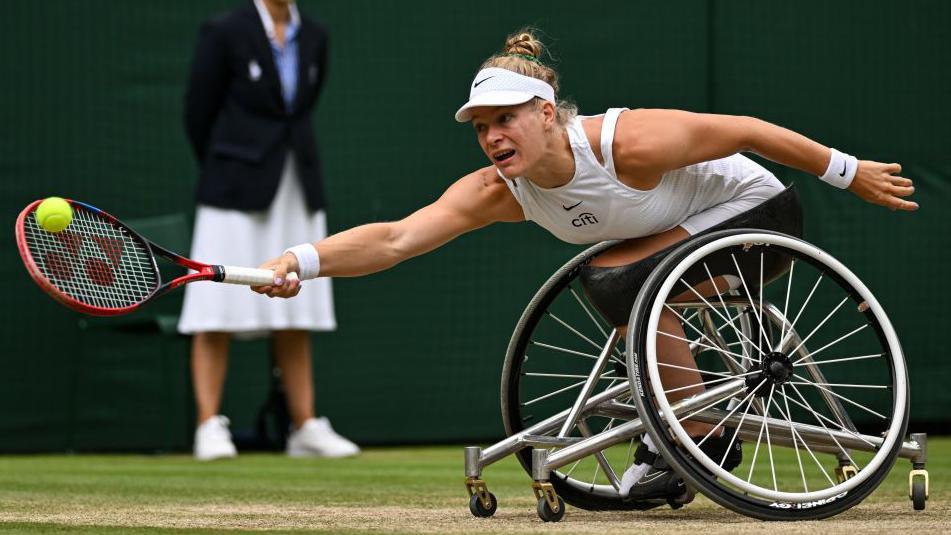
Diede de Groot is world number one in both singles and doubles
Dutch women have dominated wheelchair tennis for many years and De Groot is the latest star.
The 27-year-old is world number one in both singles and doubles and won gold in both events in Tokyo, the latter with Aniek van Koot.
Born with her right leg shorter than the other, she started playing wheelchair tennis aged seven and has dominated the sport since her breakthrough in 2017.
She is the first player - wheelchair or non-disabled - to win three successive calendar Grand Slams and among her multiple titles are five French Open singles and six doubles titles at Roland Garros, where the Paralympic wheelchair tennis events will take place.
Earlier this year, she was named the Laureus World Sportsperson of the Year with a Disability - following compatriot Esther Vergeer who won it in 2002 and 2008.
Women's doubles final: Thursday, 5 September; Women's singles final: Friday, 6 September.
Marcel Hug (Switzerland) - Para-athletics
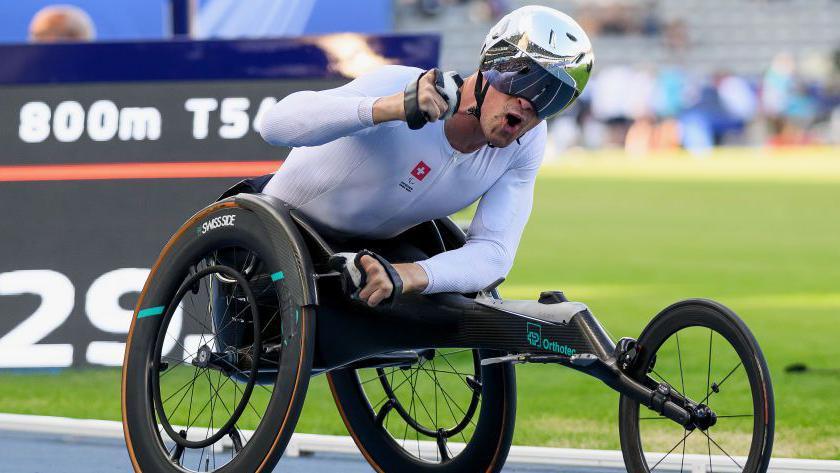
Marcel Hug won four golds at the Tokyo Paralympics
Hug's silver helmet has seen him dubbed the Silver Bullet but he is no stranger to gold and, as one of the stars of his sport, the 38-year-old will be hoping to add to his six Paralympic titles at the Stade de France.
Hug was second best to Britain's David Weir at London 2012 but made his breakthrough four years later in Rio.
The Swiss won his first gold in Rio in the T54 800m before adding another in the marathon.
In Tokyo, he completed a clean sweep of wins in the 800m, 1500m, 5,000m and marathon before adding another three golds on the track in Paris at last year's Worlds.
As well as the track, Hug also stars on the road and has multiple wins in the big city marathons of London, New York, Boston, Chicago and Berlin.
T54 5,000m: Saturday, 31 August; T54 1500m: Tuesday, 3 September; T54 800m: Thursday, 5 September; T54 Marathon: Sunday, 8 September.
Oksana Masters (United States) - Para-cycling
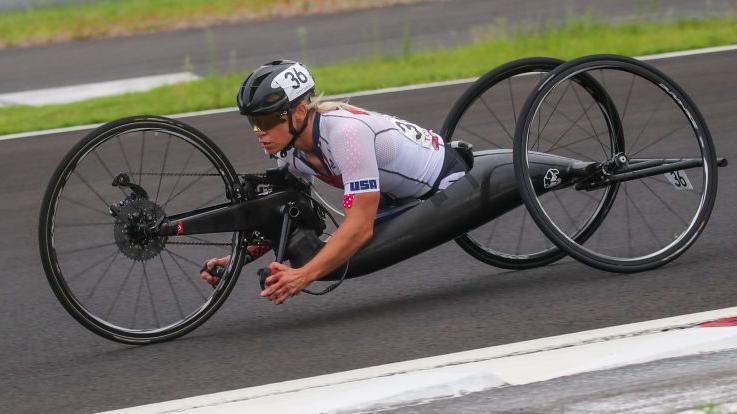
Oksana Masters started out as a rower before switching to Para-cycling and cross-country skiing
Masters has overcome much trauma to become a star of both summer and winter Paralympics.
She was born in Ukraine in 1989 with multiple birth defects, three years after the Chernobyl disaster, and after being abandoned by her birth parents she grew up in an orphanage where she was regularly beaten and abused.
Aged seven, she was adopted by American woman Gay Masters and eventually had both of her legs amputated above the knee and had surgery on her hands.
After starting her sporting career as a rower and competing at London 2012, winning bronze, she switched to Para-cycling and cross-country skiing.
She won two golds at the 2018 Winter Games in Pyeongchang before securing two golds on the road in Japan, then following up with three more golds at the 2022 Winters in Beijing in cross-country and biathlon.
Last year, she released her autobiography, The Hard Parts, where she told her powerful story.
H4-5 time trial: Wednesday, 4 September; H5 road race: Thursday, 5 September
Markus Rehm (Germany) - Para-athletics
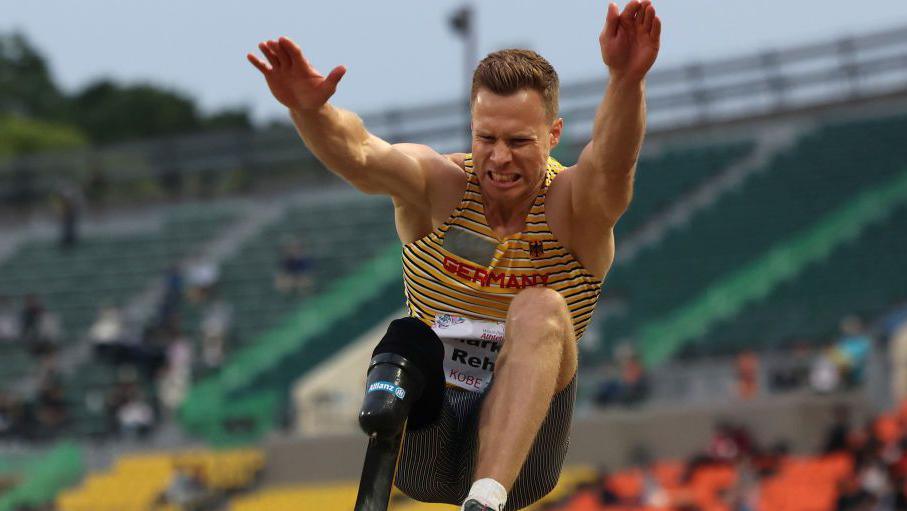
Markus Rehm's current long jump world record stands at 8.72m
The man known as the Blade Jumper is an overwhelming favourite to win a fourth Paralympic long jump title in Paris.
Rehm, who lost his right leg below the knee in a wakeboarding accident in 2003 and jumps using a bladed prosthesis, has been the star of Para-athletics since his international debut at the 2011 Worlds in New Zealand, constantly pushing the boundaries of his T64 event.
His current world record stands at 8.72m - the ninth-longest jump of all time and his 2024 best is 8.44m - a distance which would have won Olympic silver in Paris and gold at the previous four Games.
However, he is unable to compete at the Olympics because it was ruled that jumping off his prosthesis gives him an advantage over non-amputees.
The Olympics' loss is the Paralympics' gain and Rehm in full flight is a sight to behold.
T64 long jump: Wednesday, 4 September
Sheetal Devi (India) - Para-archery
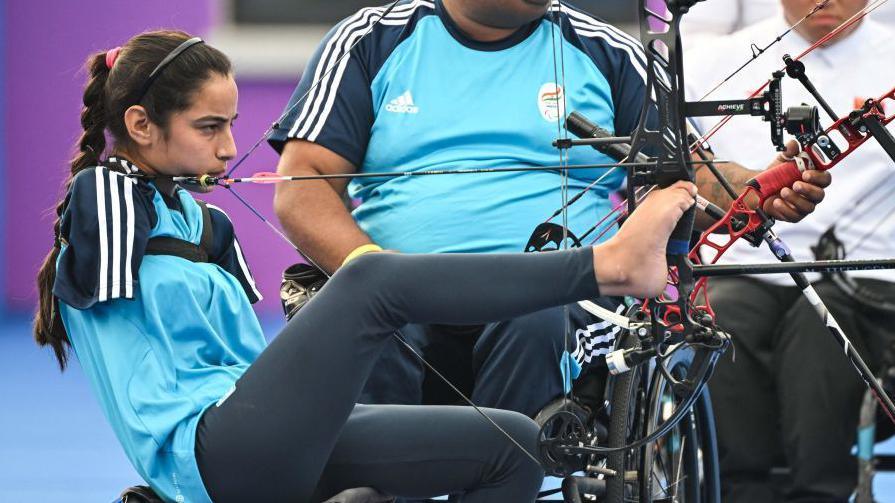
Sheetal Devi is the first and only female Para-archer to compete internationally without arms
Aged only 17, Devi will be one of the youngest competitors both in archery and at the Games as a whole.
The Indian was born with a condition called phocomelia and is missing her upper limbs.
However, she shoots arrows using her feet and is the first and only female Para-archer to compete internationally without arms.
She discovered archery three years ago and although coaches initially suggested that she use a prosthesis, she gained inspiration from American Matt Stutzman, the 2012 Paralympic silver medallist and 2022 world champion who was also born without arms.
Her first major event was at the 2022 Asian Para Games where she won women's individual compound gold and mixed doubles gold. She also took silver in the women's doubles before claiming individual world silver last year and goes in as world number one.
Women's individual compound: Saturday 31 August; Mixed team compound: Monday, 2 September
All you need to know about the Paris Paralympics
- Published28 August 2024
GB athletes to follow in Paris Paralympics
- Published28 August 2024
Alexis Hanquinquant (France) - Para-triathlon
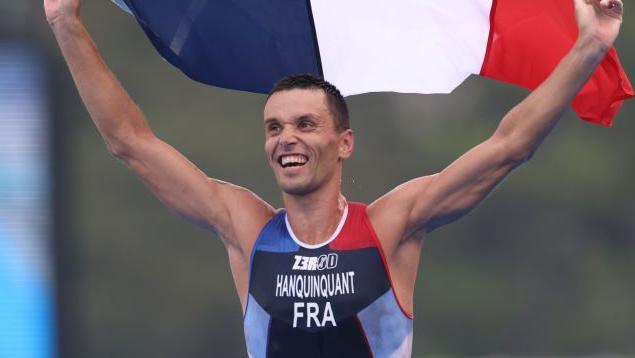
Alexis Hanquinquant is unbeaten since winning gold at the Tokyo Games in 2021
The 38-year-old from Normandy is one of France's main hopes for gold at the Games.
Hanquinquant is the defending Paralympic champion in the PTS4 category and has been the dominant figure in the division since his international debut in June 2016. He is unbeaten since his Tokyo win.
A keen basketball player and combat sports practitioner, he had a work accident in 2010 and had his leg amputated below the knee three years later.
He made his Para-sport breakthrough too late for Rio but by Tokyo he was a multiple world champion and secured gold by almost three minutes from his nearest rival.
Along with Para-athlete Nantenin Keita, the father of two was voted by his team-mates to carry the French flag at the opening ceremony of the Paris Games.
Men's PTS4 triathlon: Sunday, 1 September.
Morgan Stickney (United States) - Para-swimming
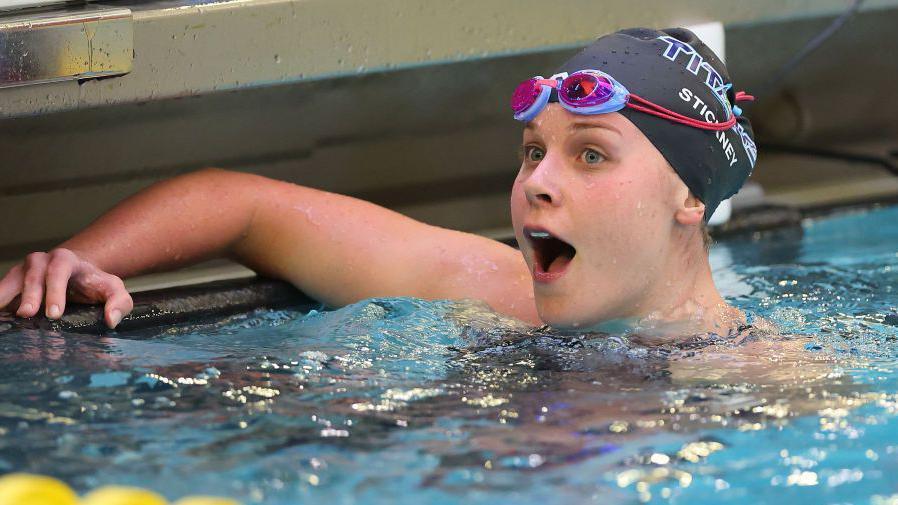
Stickney's first sporting dream was to swim at the Olympics and she was ranked nationally in the top 20 aged 15 before she broke bones in her left foot - which was eventually amputated in May 2018 because of pain and complications.
That was the start of her medical challenges, which led to her being diagnosed with a rare vascular condition which prevents sufficient blood supply from reaching her limbs.
Stickney had a second below-the-knee amputation in 2019 and said then she would never swim again, but returned to the pool during the Covid pandemic and fell back in love with the sport. She went on to win two golds in Tokyo - her first international Para-swimming event.
Since then, the condition has progressed and she has lost more of her legs and it is also affecting her whole body.
In the build-up to the Games, Stickney, now 27, has had to spend 10 days or more in hospital in Boston every month for treatment but is fiercely determined to once again shine on the big stage.
S7 400m freestyle: Monday, 2 September; S7 100m freestyle: Wednesday, 4 September